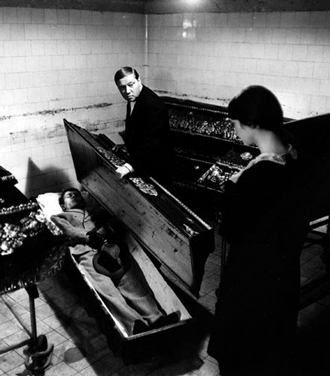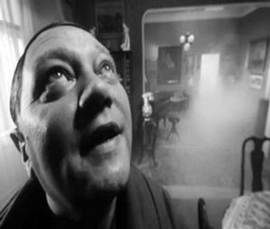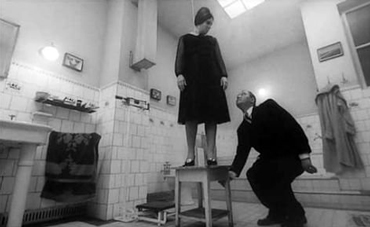
 |
|
|
|
The Cremator is a dark, very surreal black comedy, a disturbingly morbid revisit of The Loved One mixed with the historical dread of the well known Czech film The Shop On Main Street. The only label that begins to fit the show is Psychological Horror, but that doesn't take into account author Ladislav Fuks' insightful analysis of the insidious spread of Nazi influence in his country just prior to WW2. The story concerns Karl Kopfrkingl (Rudolf Hrusinsky), the smug director of a large crematorium located next to a cemetery. Karl's various manias are immediately apparent. He believes in neatness and order but inspires mostly fear and loathing in his lowly employees. Through a constant voiceover we learn that he considers cremation the solution for all problems. He takes a paternal attitude toward others but clearly hasn't their best interests in mind. Although he claims he has sex only with his wife, Karl visits his doctor every week to be checked for venereal disease. He also indulges fantasies of divine inspiration -- as a Buddhist. 
Karl's embrace of Naziism represents the social madness that overtook Czechoslovakia around the time of the Munich Agreement of 1938, when it became obvious that Germany intended to simply take over the country. With no actual troops in sight, Czech Nazis are already making preparations. Kopfrkingl is contacted by several men who praise him and tell him that the New Order will need to make use of his expertise. Karl parties in brothels with his new friends, enjoying his vices but maintaining his personal purity; he's assured that he has nothing to worry about because all of the girls are blondes. Soon Karl is fantasizing about a noble mission to purify entire populations in a much larger complex of crematoriums. Corrupt bodies will be destroyed, and separated from their souls, which will be free to ascend to the spiritual plane. Karl accepts without question that his Jewish and part-Jewish employees will need to be eliminated. Upon hearing that his wife's part-Jewish blood cannot be allowed to get in the way of his destiny, Karl makes plans to "correct the situation." The Cremator has several kinds of Weird going on at once, creating a truly creepy, disturbed mood. The nervous, feverish cutting puts us on edge right away. The show starts in the middle of a flashback to the zoo, flashing on details of animals as Karl describes his bride, who he met at the leopard cage. When Karl's not narrating a demented version of reality, he's lecturing people. His wife and his employees remain silent as he interprets reality from the Kopfrkingl point of view. Occasional bizarre fish-eye shots intrude, along with jump cuts to visualizations of Karl's disturbing thoughts. As he fantasizes the "removal" of inconvenient people, we see a succession of victims screaming as they fall away into a black void. 
A portrayed by Rudolf Hrusinsky, Karl Kopfrkingl wears a constant serene smile that doesn't quite match his focused eyes. The outwardly calm face masks 1,001 hidden thoughts, none of them good news. Karl is careful not to react when he hears that his boy Mili (Milos Vognic) is "getting in shape to punch out Nazis". He wants everyone around him to remain calm while he makes his plans. Karl dreams of his glorious future in the New Order, where he will reign over an empire of death. He fantasizes a Tibetan monk (in his own image), who arrives to inform him that he's been chosen to become the new Dalai Lama. Karl takes a rain check; he must first put his house in order. Karl doesn't have to concern himself with the undesirables on his payroll; a car of special agents arrives to spirit them away. But he takes the initiative when it comes time to "resolve" his family issues. With the children off at relatives, he asks his wife to put on her favorite dress, and then to help him do something involving a lamp on the bathroom ceiling. He takes his son on a friendly walk through the cemetery to the crematorium, to show him something special among the coffins in the storeroom. Mother and Mili are so accustomed to Dad's soothing voice of authority, that they follow his instructions without question. Even if we can see what's coming, The Cremator sustains its eccentric, difficult-to-describe mood: an Eastern European fear of helplessness against self-assured authority figures in an unequal power situation. Karl's final big speech transforms a family funeral into a Nazi rally complete with hateful, shouted slogans. 
Actor-Director Juraj Herz is still making films in Germany and Czechoslovakia. Among his efforts is 1981's Ferat Vampire which the IMDB describes as being about a car that runs on human blood. According to scholar Daniel Bird, the fantastic runs through all of Herz's films. Interestingly, at the beginning of his career, Herz served as assistant director on Jan Kadar's The Shop on Main Street. The director doesn't consider himself part of the Czech New Wave of the late 1960s. Dark Sky's DVD of Juraj Herz's The Cremator is a sharp enhanced B&W transfer of this expertly filmed show. Even the exteriors of the impressive crematorium are disturbing. Zdenek Liska's unusual music score adds to the morbid, eccentric atmosphere. We're pleased that Dark Sky saw fit to import this very atypical obscurity. The movie was given a Czech theatrical reissue in 2004. This version carries no extras. The version on view appears to be uncut. An alternate version five or six minutes shorter may have trimmed some scenes of nudity and sex activity in the brothel, some of which is surprisingly explicit for an Eastern bloc film, even during the "Prague Spring". The clear English subtitles are removable, should you want to review the eccentric montages cued to Karl Kopfrkingl's erratic thought process. 1
To Excess: The grotesque in Juraj Herz's Czech films at KinoEye.
On a scale of Excellent, Good, Fair, and Poor,
The Cremator rates:
Footnotes:
1. I've tried on occasion to properly reproduce Czech accents and other diacritical marks, and have been advised by a (friendly!) correspondent from Prague that I would be better off just leaving words plain. This explains the accent-challenged review. I assume that I'm likewise mutilating other languages just as efficiently. A thousand pardons, & build my gallows high!
Reviews on the Savant main site have additional credits information and are often updated and annotated with reader input and graphics. Also, don't forget the 2009 Savant Wish List. T'was Ever Thus.
Review Staff | About DVD Talk | Newsletter Subscribe | Join DVD Talk Forum |
| ||||||||||||||||||